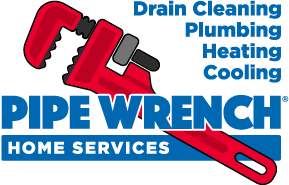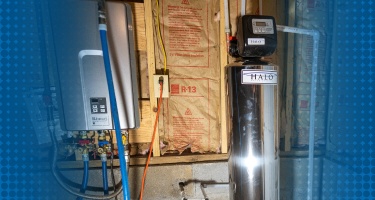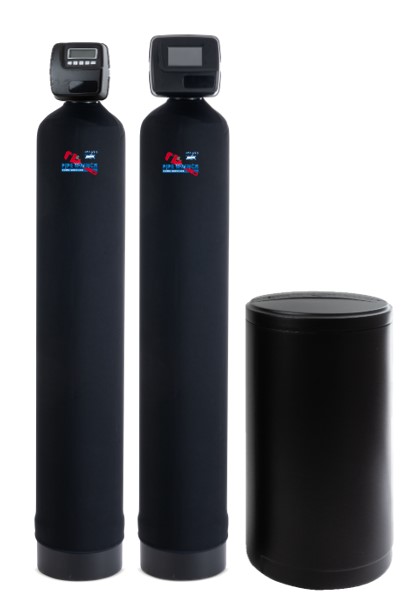Water Softening Systems in Knoxville, TN
The local water supply in Knoxville, TN and surrounding counties have moderately “hard” water, meaning it contains higher levels of calcium and magnesium. According to the US Geological Survey, almost 90% of homes in the United States are affected by hard water.
These dissolved minerals can damage your plumbing system and appliances, and affect your dishes, clothes, and skin and hair. It can even make taking showers uncomfortable. Water softeners can help minimize limescale buildup, prolong the lifespan of your appliances, decrease soap scum, soften skin and hair, lower utility bills, and more.
Do you want to combat the effects of hard water? Contact your Knoxville water softener installation technicians at Pipe Wrench Plumbing, Heating & Cooling to start enjoying cleaner, fresher water.
Hard water contains high levels of calcium and magnesium. These elements can damage your plumbing and appliances, and affect your dishes, clothes, and skin and hair. It can even make taking showers uncomfortable. Want to combat the effects of hard water? Contact your Knoxville water softener installation technicians at Pipe Wrench Plumbing, Heating & Cooling to start enjoying cleaner, fresher water.
Hard water ruining your dishes, clothes, skin, or hair? Stop the problem today. Call your Knoxville water softener installation experts at (865) 583-3957 or book online today.
How do water softeners work?
In the simplest of terms, water softeners remove minerals such as calcium and magnesium from your home’s water supply, which are the main causes for “hard” water.
In East Tennessee, both groundwater and surface water sources naturally contain these minerals. However, if a water supply has high acidity, some municipal water providers may also add these minerals to raise the pH level, helping to protect the water line infrastructure and address health concerns.
There are different types of water systems that claim to soften water, but the most common and effective process is a salt-based water softener. By using a process known as ion exchange, salt-based water softeners replace the hard minerals with sodium ions that helps remove minerals and “soften” the water.
Water softeners differ from home water filtration systems, in that they specifically target and remove minerals from your water supply. In contrast, water filtration systems enhance water taste and quality by eliminating contaminants like chemicals, bacteria, sediment, and heavy metals. Pipe Wrench offers both water filtration and water softening solutions in a joint system to address hard water issues and remove undesirable contaminants, ensuring complete protection for your family and your home’s plumbing system.
The Benefits of Water Softeners
Living with untreated hard water can be difficult. Once we install a water softener system for you, you will notice the benefits right away. Your water softener will work to keep the harsh minerals found in hard water from entering your home’s water supply.
Enjoy these benefits with a new water softener:
- Cleaner pipes: The minerals in hard water can cause limescale build up and leave deposits in your pipes, causing blockages that reduce water flow and pressure. Water softeners can help prevent scale buildup and lowers the risk of plumbing system problems.
-
Cleaner fixtures: Hard water can leave unsightly stains on your sinks and tubs. Water softeners help prevent limescale buildup in your fixtures including faucets and showerheads.
-
Softer hair and skin: The minerals in hard water can dry out your skin and hair leading to flakes and even damage. Now, showers will leave your skin and hair feeling smoother and softer.
-
Longer lasting appliances: Appliances that are connected to your water supply, will last longer with a water softener. The minerals in hard water can clog the water lines connected to your water heater, dishwasher, washing machine, or ice maker. By reducing the effects of these minerals, your appliances will run more efficiently.
-
Improved water heater efficiency: Hard water can make your water heater work harder. Mineral deposits in the tank can lead to corrosion if not flushed out regularly, but your water heater will run more efficiently after a water softener is installed as it only heats the water and not the scale buildup.
- Lower utility bills: By reducing the risk of mineral deposits and corrosion, your appliances will run more efficiently, and your water flow won’t be restricted helping to lower the cost of energy and utility bills.
- Cleaner dishes and clothes: By softening your water supply, you can prevent mineral spots and soap film in your dishes and glassware, and your clothes will be brighter and softer by preventing fading and fabric damage.
- Less cleaning: By removing hard water, you will use less soap and detergent on clothes and dishes and reduce soap scum that will make cleaning your kitchen or bathroom easier.
Signs You Have Hard Water & Should Install a Water Softener
The most prominent sign of hard water is scale buildup on fixtures and appliances. This buildup will leave a white, yellow, or red chalky substance. It can appear in numerous places such as on shower heads, inside dishwashers, and the sides of your bathtub.
Another sign you need to install a water softener is if soaps don’t lather easily. This is because the minerals in hard water interfere with soap products. You may even have a layer of soap scum or residue left behind on your skin after showering or bathing.
Dull-looking or discolored clothes after just a few washes also signal hard water.
Do Water Softeners Need Maintenance?
One of the advantages of modern water softeners is that they require little maintenance, however, they still require some care when it comes to refilling the brine tank if you install a salt-based water softener. How often you refill the tank depends on several factors, including water hardness level, and water usage. The average homeowner needs to fills the brine tank with salt every 6-10 weeks to keep the water softener operating in top condition.
Is your water softener having problems? Contact us for immediate water softener system repair. Common water softener problems include mechanical problems, clogged brine refill control, and undissolved residue blocking water from flowing in and out of the brine tank.
Why Choose Pipe Wrench Plumbing, Heating & Cooling?
For decades, the experts at Pipe Wrench Plumbing, Heating & Cooling have provided exceptional plumbing services to countless customers throughout Knoxville, TN. We are a local company, so you will work with professionals from the area who are highly skilled and knowledgeable about the water quality and plumbing needs of the greater Knoxville area and East Tennessee.
If you think your home would benefit from a water softener, but you aren’t sure if you have hard water, then schedule an on-site water quality assessment with our knowledgeable and certified technicians. We will test the quality and PH levels of your water, review the detailed report with you in person, outline the possible options, and then recommend the best long-term solution to help improve your water quality.
If you want an initial assessment of your tap water quality from the Environmental Working Group, click here for a free report by entering in your zip code and selecting your utility provider.
We offer emergency services, top-quality products, and a dedication to customer satisfaction. Take the best care of your water quality and plumbing system with help from Pipe Wrench Plumbing, Heating & Cooling.
Is it time you made a change to improve your overall water quality? Make your hard water problems go away with a new water softener system. Call us today at (865) 583-3957 or book online to work with Knoxville’s award-winning plumbing experts.
Related reading:
- Do homes in East Tennessee need water softeners? INSERT LINK TO NEW BLOG
- Should I wash my produce with filtered water?
- Here’s why your should only give your dog filtered water
Frequently Asked Questions
Is it worth putting in a water softener? Or why do I need a water softener?
Yes, it is worth installing a water softener system to combat hard water caused by minerals such as calcium and magnesium. Water softeners can help minimize limescale buildup, extend the lifespan of your appliances including water heaters and washing machines, reduce soap scum, soften skin and hair, lower utility bills, and offer additional benefits that are listed above.
What is the downside of a water softener?
- The two main drawbacks often associated with water softeners are cost and maintenance.
- Depending on the type and size of the water softener you install in your home, the initial investment and installation can be significant.
- Water softeners also require some maintenance, such as refilling brine tank if you use a salt-based system along with routine inspections.
What is the best water softener system?
Salt-based or Ion exchange water softeners are the most common and usually considered the most effective, that use a process called ion exchange that replaces minerals with sodium ions to remove minerals and “soften” the water.
Can you drink water from a water softener?
- Yes, softened water is perfectly safe to drink. Some sources caution against the additional sodium in softened water but overall professionals agree that soft water is very safe to drink.
- Due to some increased sodium levels in softened water, it is generally not recommended for long-term use when watering indoor plants.


